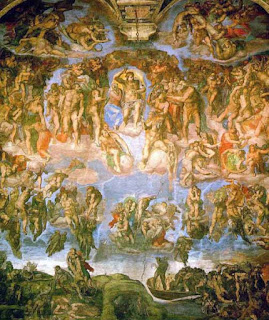 Aristotle's Unmoved Mover concept likely had its roots in some of the thought of Parmenides of Elea [c. 515-450 BC]. Parmenides always spoke about the One, the unity that is hidden behind the diversity of our world of experience. He never ascribed to it relatability, but frequently spoke of it in terms of Being.
Aristotle's Unmoved Mover concept likely had its roots in some of the thought of Parmenides of Elea [c. 515-450 BC]. Parmenides always spoke about the One, the unity that is hidden behind the diversity of our world of experience. He never ascribed to it relatability, but frequently spoke of it in terms of Being.Jonathan Edwards thought deeply here as well. He said that we cannot think of God as a being because that would subliminally suggest that we or other things that have being are made of the same stuff. Edwards posited that God is "Being in general." In truth, to use the word "is" in the previous sentence is to begin to undefine the fact.
But back to Parminedes. He sought to delineate between what is, what truly is, and what seems to be. He thought that knowing this distinction was only available through reason. Leszek Kolakowski has commented on these ontologically gnostic ideas in Parmenides. Kolakowski says that for Parmenides,
what truly is cannot have been created, or that would mean that something comes from nothing, and that is impossible. Nor can it change, decay, or die: it is perfectly fulfilled and unchanging, with no beginning or end. Nor can it be said to "have been" or to be "going to be"; it simply is, beyond time, without time.... He means that Being is full and sufficient unto itself.I'd like to point out a couple of things here. I would almost completely agree. However, it really is impossible for something to come from nothing, unless the Unity or Being causing the something is Divine, Wise, and wholly Good. Additionally, all his talk of Being and the essence of the One behind all we comprehend.... this is precisely how the God of the Bible defines and reveals Himself. That is the definition of YHWH in Exodus 3 - "I AM WHO I AM." This name comes directly from the Hebrew "to be" verb, hayah.
Lastly, there is more beauty in untainted Being than can be found anywhere. This is why the Michelangelo's statue of David is naked. David purely is. He just is. This is why trying to define affectionate relationships is so hard. They just are. And they're beautiful. So then, how much more excellent, radiant, right, and lovely is the Being that has never not been. "He is the radiance of God's glory and the exact representation of His nature and He upholds all things by the word of His power" [Heb 1.3].










































